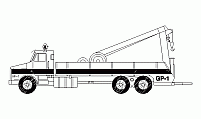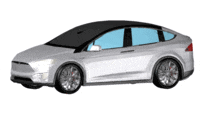CAD Blocks categories
 3D models
3D models home furniture
home furniture sanitary ware - bathrooms
sanitary ware - bathrooms professional equipment
professional equipment doors and windows
doors and windows people and animals
people and animals plants and trees
plants and trees vehicles - transports
vehicles - transports architectural details
architectural details mechanical - electrical
mechanical - electrical urban planning - civil works
urban planning - civil works safety health construction
safety health construction accessible design
accessible design drawing sheet
drawing sheet signals
signals construction machinery
construction machinery accessories and objects
accessories and objects maps and street maps
maps and street maps
CAD Block of Crane with Tracks

size: 28 kb
category: vehicles - transports - industrial transportation
description: top view of a crane with caterpillar tracks, showing the machinery layout, track positioning, and structural details.
file extension: .dwg CAD - AutoCAD software
Crane with Caterpillar Tracks in .DWG Format
Detailed Overview of Crane with Tracks CAD Block
The crane with caterpillar tracks CAD block offers a comprehensive representation of heavy-duty lifting equipment. This model is specifically designed for applications in commercial logistics and construction, where stability and mobility are crucial. Known also as a crawler crane or tracked crane, this block provides precision in project designs involving rough or uneven terrains.
Common Dimensions and Customization Methods
Common dimensions of these cranes often range around 240 inches (6.1 meters) in height and 400 inches (10.2 meters) in length, providing robust coverage for various load-handling tasks.
To adjust measurements between inches and meters, apply a scaling factor: use 1 inch = 0.0254 meters for converting inches to meters, and for the reverse, apply 1 meter = 39.37 inches. Use commands to scale your drawing accurately in CAD software, ensuring seamless adaptability across measurement units.
Use in Architectural and Engineering Plans
This crane block serves a vital role in engineering and architectural drawings, providing a realistic depiction of equipment frequently found in commercial and logistical project settings. Incorporating this model aids planners and designers in depicting necessary machinery within project scopes, enhancing accuracy and project efficiency.
Modification Options for Project Specificity
To tailor this crane model to specific project requirements, users can modify aspects such as the crane’s boom length, track width, and cabin size. Use modify and stretch commands to make precise adjustments. This flexibility in customization helps in adapting the crane block for unique spatial and functional needs within CAD designs.
Integrating the Crane with Other CAD Elements
The crane with tracks is frequently integrated alongside other commercial vehicle elements, such as dump trucks and forklifts, within technical drawings. Its interoperability with other CAD blocks allows engineers and designers to create comprehensive logistical layouts, facilitating optimal space utilization and efficient equipment positioning.






















